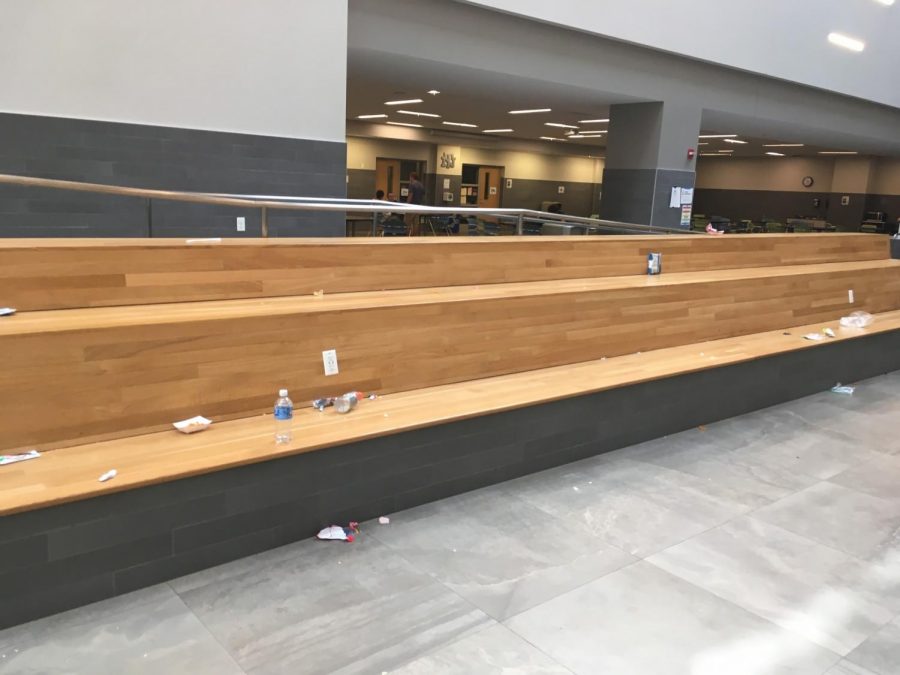NT students are trash at picking up their trash
Students create extra work for custodial staff
The wooden stairs in the scrounge are covered with trash every day, despite the school’s anti-littering efforts
Throughout the school, students are leaving their trash out instead of throwing it away.
This renders many common spaces nearly unusable when they are covered in other people’s trash.
Physical Plant services head Dave Conway, who has worked at New Trier for thirty years, has dealt with garbage management issues in the past and says that although the problem is bad now, it has been worse.
“Twenty-five years ago it was really bad. It seemed like no one picked up after themselves, and then the administration and principal and teachers got involved and started a process where they educated students on how to better manage their trash,” said Conway. “It has gotten much better over the years.”
However, students continue to find lots of litter around the school. Most of it is in the cafeteria and library commons, but other popular spaces, like the benches in the scrounge, also have large amounts of trash.
“I have fourth period lunch so [the benches] are not dirty, but I’ll go down during seventh period because I have it free. I used to go more in the first two weeks of school, but now it’s so dirty that I sit [in the hallways],” said sophomore Emma Powers.
Sophomore Cate Regan, who spends her study halls on the fourth floor, said that she is often distracted by the trash while she tries to study.
“It’s definitely annoying and disappointing to see people leave garbage all over the place when you’re trying to focus and get work done,” said Regan.
In fact, students eating where they’re not supposed to has been such a large problem that the library banned all food and drinks to prevent
it from looking like its much dirtier neighbor, the commons.
“If you look in the commons you can see where things have spilled, where people may not have cleaned up after themselves and someone else. You can see on some of the furniture there are stains,” said librarian Linda Straube. “We say in sophomore orientation ‘if there’s carpet beneath your feet, then you can’t eat.’”
Often, students who sit in the cafeteria and library commons for lunch leave their trash where they sat, which can cause a problem for other students. Equipment assistant Beth Lopiccolo, a hall monitor during sixth period lunch in the library commons, often has to clean up for students from the period before.
“If the period before doesn’t clean up, I pick it up and put it away. Sixth period is my lunch period, but sometimes I come early to talk to the kids from the period before and tell them to please pick up their trash,” said Lopiccolo.
It also creates unnecessary extra work for the custodial staff. Oddie Sanchez, who takes out the trash on the first and third floor, believes that students should take more responsibility to clean up their trash.
“We have to clean up about one can of garbage every day,” said Sanchez, adding that “the same students tend to leave out their garbage.”
Some students believe that their classmates don’t litter with the intention to make the school dirtier– they are just too lazy to pick up their trash.
“I think some people just don’t care or they purposely leave it there because they think they don’t have time to pick it up or they can’t find a garbage can, even though there’s so many,” said Regan.
As a solution, the school has used media to educate students in the past.
“Five or six years ago, one of the student organizations created a video that was shown during advisory,” said Assistant Principal of Student Services Mike Lee.
“The video was entertaining, it was funny,” Lee said. “Generally speaking, people thought [the littering problem] was improving.”
Lee didn’t mention an ongoing plan to show students the value of throwing away their trash. For now, he says, the hall monitors most directly deal with littering and regulate trash pickup.
“I’m hoping that most of the cafeteria supervisors are going to establish some sort of relationship with the students, because they’re there almost every day and just ask the students politely to make sure they clean up after themselves.”







































